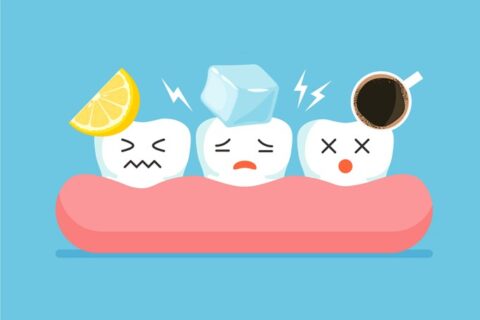How Stress Impacts Your Oral Health
Stress is a survival mechanism intended to give you quick bursts of the “fight or flight” response. However, chronic stress is a health problem for many people. Constantly elevated cortisol levels commandeer your daily habits, your sleep patterns, and even the way your jaw functions. You probably know that muscle tension and mental fatigue are associated with stress, but you might not realize your mouth also pays a high price. Learn the connection between chronic stress and oral health to protect your smile and overall wellness.
How Stress Affects Your Mouth
Stress and oral health live in a constant feedback loop: when one suffers, the other follows. Here are the top ways your mouth manifests the effects of stress:
- Gum recession: Cortisol-driven inflammation weakens gum tissue, making it more susceptible to recession. This opens the door to decay and infection near the gum line and often makes teeth feel tender at the roots.
- Gum disease: Stress reduces your body’s ability to fight off bacterial colonies around gum tissue. This paves the way for gingivitis and periodontal disease, even for those with good oral hygiene. The first sign is often bleeding and swollen gums, which you should treat before the condition worsens.
- Mouth sores and ulcers: Stress disrupts the immune response in your mouth, making canker sores appear more frequently. Rough teeth edges, orthodontic appliances, or accidental biting further irritate these tender spots.
- Dry mouth and bad breath: Saliva cleans your mouth and balances oral bacteria levels. When stress shuts down your salivary glands, dryness sets in. The resulting bacterial imbalance triggers odor and inflammation. You might even find yourself reaching for mints or mouthwash more often than usual.
- Bruxism: When life stresses you out, nighttime teeth grinding often follows. Grinding or clenching subjects your enamel to enormous force, chipping teeth and wearing down biting surfaces. On restless nights, you might wake up with an aching jaw or a morning headache.
- TMJ disorders: Stress-induced jaw clenching strains the temporomandibular joint (TMJ). The result may include popping, locking, or persistent jaw pain. Missing teeth or misaligned bites amplify the tension.
- Cracked or fractured teeth: Stress can spark jaw tension powerful enough to crack teeth. Small fractures usually go unnoticed until they become problematic. If ignored, cracks may require restorative procedures such as crowns or root canals.
- Neglected oral care: Your jam-packed schedule may tempt you to cut corners on your self-care routine. If you skip flossing or brushing a few nights a week or let dental visits fall through the cracks, minor buildup may escalate into problems requiring more intensive intervention.
- Broken dental work: Restorations such as crowns, veneers, and fillings face added pressure under stress. Clenching can loosen margins, damage seals, or dislodge restorations altogether. The resulting emergency dentist visits only add to your stress.
- Acid reflux: Stress can worsen acid reflux symptoms, especially at night. Acid erodes enamel if not neutralized quickly. Combined with bruxism, the overnight damage can be substantial.

Tips to Stop Stress from Affecting Your Oral Health
Stamping out stress entirely isn’t realistic, but you can reduce its impact on your mouth with these practical tips:
- Invest in a custom mouthguard: A professionally made guard protects your teeth from clenching and grinding while you sleep. Bruxism causes vary, but stress is a common trigger. Unlike over-the-counter mouthguards, custom versions fit precisely to reduce jaw tension and prevent damage to your teeth and gums. For anyone who grinds under pressure, this is one of the most effective Scottsdale dentist tips.
- Stay hydrated: Drinking water consistently supports your natural oral defenses and keeps dryness from snowballing. Just avoid substances that can worsen dry mouth, like caffeine and alcohol.
- Keep up with oral hygiene: Stress isn’t an excuse to skip brushing or flossing. Keep a travel hygiene kit in your bag so you can care for your smile even on hectic days.
- Schedule regular dental checkups: Dentists closely examine your teeth and gums to spot the subtle signs of stress-related wear and recession. These appointments allow you to catch issues before they become emergencies.
- Practice jaw mobility exercises: Small movements such as opening your mouth wide, shifting your lower jaw from side to side, and massaging your joints help alleviate TMJ tension.
- Improve sleep hygiene: Set a nighttime ritual that signals your body to wind down. This might include dimming the lights, avoiding screens within one hour of bedtime, and creating a soothing bedroom environment. Better sleep reduces bruxism and morning jaw tightness.
Schedule Your Next Dentist Visit
Don’t let stress wreak havoc on your oral health. If you have concerns, reach out to S&C Dental Scottsdale. Fitting dentist visits into your busy schedule helps you stay on top of stress-related concerns as they arise. Your comfort and confidence matter deeply to us, so expect a calm, gentle approach, no matter what treatment you need. Contact our Scottsdale office or schedule your appointment online today.


